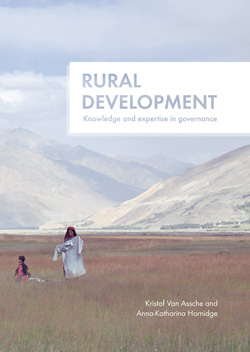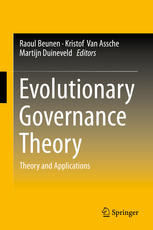10 proposals for change that, once implemented, will make the planning system less rigid and more adaptive.

> New book. Free download @ InPlanning.
> More information about Evolutionary Governance @ governancetheory.com.
Spatial planning is facing a paradox. The last decades have witnessed a growing number of scholars and professionals that criticize the possibilities of planning and who repeatedly show that planning fails to live up to its promises. Planning, some argue, is an ideal of the past that got dashed in the complex reality of contemporary society. Others take a more positive stance and believe spatial planning is indispensable if we want to tackle environmental and social issues, like climate change, rapid urban development, the increasing economic & social inequality in cities, food security, the decline of biodiversity and so on. Dealing with these opposite views on the possibilities and limits of planning requires us to develop novel perspectives on what planning is and how it works in different contexts, as well as new approaches that can help in realizing desired futures.
The book Spatial Planning in a Complex and Unpredictable World of Change, edited by Luuk Boelens and Gert de Roo, explores such novel perspective on spatial planning, taking into account the dynamic, non-linear, and often unpredictable nature of planning practices. It seeks innovation in planning theory and planning practices. For that reason it brings together theoretical and empirical reflections that seek to unravel and explain the processes of co-evolution that mark governance and planning. In the chapter Evolutionary Governance Theory and the Adaptive Capacity of the Dutch Planning System by Raoul Beunen, Martijn Duineveld and Kristof Van Assche, Evolutionary Governance Theory is explained and developed to reflect on the success and failures of the Dutch planning system and its possibilities to adapt to ever changing circumstances.
Evolutionary Governance Theory is a novel framework for understanding the changing roles and forms of planning in a society. It is a theory of planning, steering and management that takes non-linearity and unpredictability into account. Therewith it offers a more refined understanding of how planning really works. Using the concepts of path, inter and goal dependency, we explore the possible pathways of planning in the Netherland. We conclude that the acceptance of complexity and non-linearity demand the planning system to embrace and enhance reflexivity and flexibility as important prerequisites for adaptation and innovation.
We end our chapter with a list of ten changes that, once implemented, will make the planning system less rigid and more adaptive.
The complete book can be downloaded from the website of InPlanning. Our chapter Evolutionary Governance Theory and the Adaptive Capacity of the Dutch Planning System can also be downloaded from Researchgate. More information about Evolutionary Governance Theory and innovation in governance can be found at the website http://governancetheory.com.


 The topic of rural development has received attention from a wide range of disciplines and professions. Many books and articles have been written, presenting success stories, critical reflections, and very detailed guidelines on how to realize development.
The topic of rural development has received attention from a wide range of disciplines and professions. Many books and articles have been written, presenting success stories, critical reflections, and very detailed guidelines on how to realize development. has funded scientific research in the Danube Delta. Field work was carried out in both the Romania and the Ukrainian side of the border. This book presents the findings of this work. The Danube Delta is one of the largest and most valuable wetlands in Europe. Throughout history it has been a contested area and subject to conflicting claims and policies from the Ottoman Empire, Russia, Romania, the Soviet Union, and Ukraine. In this volume Constantin Iordachi and Kirstof Van Assche take an interdisciplinary look at the history, policy, and culture of the development and politics of the Danube Delta.
has funded scientific research in the Danube Delta. Field work was carried out in both the Romania and the Ukrainian side of the border. This book presents the findings of this work. The Danube Delta is one of the largest and most valuable wetlands in Europe. Throughout history it has been a contested area and subject to conflicting claims and policies from the Ottoman Empire, Russia, Romania, the Soviet Union, and Ukraine. In this volume Constantin Iordachi and Kirstof Van Assche take an interdisciplinary look at the history, policy, and culture of the development and politics of the Danube Delta. This
This 
